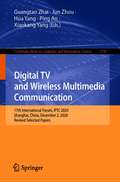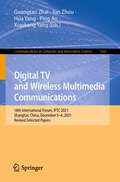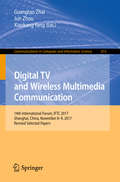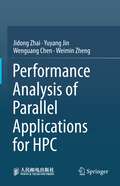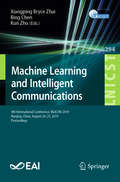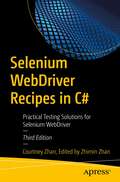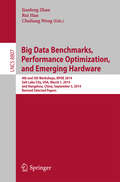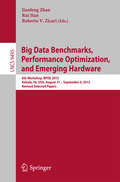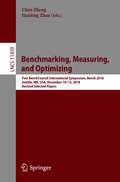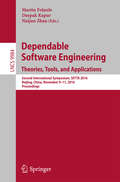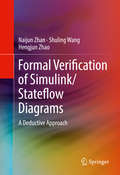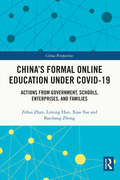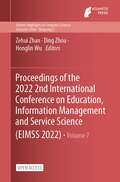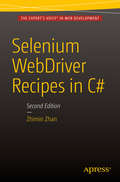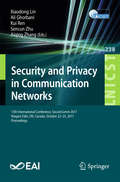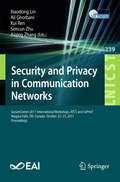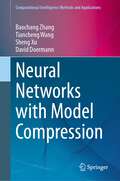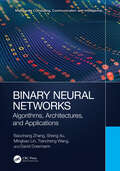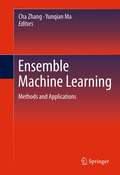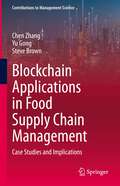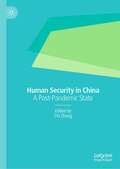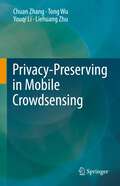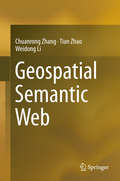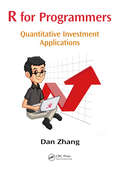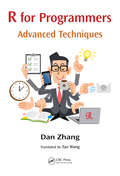- Table View
- List View
Digital TV and Wireless Multimedia Communication: 17th International Forum, IFTC 2020, Shanghai, China, December 2, 2020, Revised Selected Papers (Communications in Computer and Information Science #1390)
by Guangtao Zhai Jun Zhou Hua Yang Ping An Xiaokang YangThis book presents revised selected papers from the 17th International Forum on Digital TV and Wireless Multimedia Communication, IFTC 2020, held in Shanghai, China, in December 2020.The 21 full papers and 16 short papers presented in this volume were carefully reviewed and selected from 120 submissions. They were organized in topical sections on image processing; machine learning; quality assessment; telecommunications; video surveillance; and virtual reality.
Digital TV and Wireless Multimedia Communications: 18th International Forum, IFTC 2021, Shanghai, China, December 3–4, 2021, Revised Selected Papers (Communications in Computer and Information Science #1560)
by Guangtao Zhai Jun Zhou Hua Yang Ping An Xiaokang YangThis book presents revised selected papers from the 18th International Forum on Digital TV and Wireless Multimedia Communication, IFTC 2021, held in Shanghai, China, in December 2021.The 41 papers presented in this volume were carefully reviewed and selected from 110 submissions. They were organized in topical sections on image analysis; quality assessment; target detection; video processing; big data.
Digital TV and Wireless Multimedia Communication
by Guangtao Zhai Jun Zhou Xiaokang YangThis book presents revised selected papers from the 14th International Forum on Digital TV and Wireless Multimedia Communication, IFTC 2017, held in Shanghai, China, in November 2017. The 46 papers presented in this volume were carefully reviewed and selected from 122 submissions. They were organized in topical sections named: image processing; machine learning; quality assessment; social media; telecommunications; video surveillance; virtual reality; computer vision; and image compression.
Performance Analysis of Parallel Applications for HPC
by Jidong Zhai Yuyang Jin Wenguang Chen Weimin ZhengThis book presents a hybrid static-dynamic approach for efficient performance analysis of parallel applications on HPC systems. Performance analysis is essential to finding performance bottlenecks and understanding the performance behaviors of parallel applications on HPC systems. However, current performance analysis techniques usually incur significant overhead. Our book introduces a series of approaches for lightweight performance analysis.We combine static and dynamic analysis to reduce the overhead of performance analysis. Based on this hybrid static-dynamic approach, we then propose several innovative techniques for various performance analysis scenarios, including communication analysis, memory analysis, noise analysis, computation analysis, and scalability analysis. Through these specific performance analysis techniques, we convey to readers the idea of using static analysis to support dynamic analysis.To gain the most from the book, readers should have a basic grasp of parallel computing, computer architecture, and compilation techniques.
Machine Learning and Intelligent Communications: 4th International Conference, MLICOM 2019, Nanjing, China, August 24–25, 2019, Proceedings (Lecture Notes of the Institute for Computer Sciences, Social Informatics and Telecommunications Engineering #294)
by Xiangping Bryce Zhai Bing Chen Kun ZhuThis volume constitutes the refereed post-conference proceedings of the Fourth International Conference on Machine Learning and Intelligent Communications, MLICOM 2019, held in Nanjing, China, in August 2019. The 65 revised full papers were carefully selected from 114 submissions. The papers are organized thematically in machine learning, intelligent positioning and navigation, intelligent multimedia processing and security, wireless mobile network and security, cognitive radio and intelligent networking, IoT, intelligent satellite communications and networking, green communication and intelligent networking, ad-hoc and sensor networks, resource allocation in wireless and cloud networks, signal processing in wireless and optical communications, and intelligent cooperative communications and networking.
Selenium WebDriver Recipes in C#: Practical Testing Solutions for Selenium WebDriver
by Courtney ZhanSolve your Selenium WebDriver problems with this quick guide to automated testing of web applications with Selenium WebDriver in C#. This third edition contains hundreds of solutions to real-world problems, with clear explanations and ready-to-run Selenium test scripts that you can use in your own projects. Updated to Selenium version 4, this revision includes Visual Studio Code set up, additional recipes, and new chapters on Selenium DevTools and continuous testing. You'll see how to use Selenium WebDriver for select lists, navigation, assertions, frames, file upload and pop-up dialogs. You'll also learn how to locate web elements and test functions for hyperlinks, buttons, TextFields and TextAreas, radio buttons, CheckBoxes, and more. What You'll Learn Debug test scripts and test data Work with Selenium Remote Control Server Manage and deal with browser profiles and capabilities Monitor tests for advanced user interactions and experiences (UX) Who This Book Is For Experienced .NET and C# Windows application programmers/developers.
Big Data Benchmarks, Performance Optimization, and Emerging Hardware: 4th and 5th Workshops, BPOE 2014, Salt Lake City, USA, March 1, 2014 and Hangzhou, China, September 5, 2014, Revised Selected Papers (Lecture Notes in Computer Science #8807)
by Jianfeng Zhan Rui Han Chuliang WengThis book constitutes the thoroughly revised selected papers of the 4th and 5th workshops on Big Data Benchmarks, Performance Optimization, and Emerging Hardware, BPOE 4 and BPOE 5, held respectively in Salt Lake City, in March 2014, and in Hangzhou, in September 2014. The 16 papers presented were carefully reviewed and selected from 30 submissions. Both workshops focus on architecture and system support for big data systems, such as benchmarking; workload characterization; performance optimization and evaluation; emerging hardware.
Big Data Benchmarks, Performance Optimization, and Emerging Hardware: 6th Workshop, BPOE 2015, Kohala, HI, USA, August 31 - September 4, 2015. Revised Selected Papers (Lecture Notes in Computer Science #9495)
by Jianfeng Zhan Rui Han Roberto V. ZicariThis book constitutes the thoroughly revised selectedpapers of the 6th workshop on Big Data Benchmarks, Performance Optimization,and Emerging Hardware, BPOE 2015, held in Kohala Coast, HI, USA, inAugust/September 2015 as satellite event of VLDB 2015, the 41st InternationalConference on Very Large Data Bases. The 8 papers presented were carefully reviewedand selected from 10 submissions. The workshop focuses on architecture andsystem support for big data systems, aiming at bringing researchers andpractitioners from data management, architecture, and systems researchcommunities together to discuss the research issues at the intersection ofthese areas. This book also invites three papers from several industrialpartners, including two papers describing tools used in system benchmarking andmonitoring and one paper discussing principles and methodologies in existingbig data benchmarks.
Benchmarking, Measuring, and Optimizing: First BenchCouncil International Symposium, Bench 2018, Seattle, WA, USA, December 10-13, 2018, Revised Selected Papers (Lecture Notes in Computer Science #11459)
by Jianfeng Zhan Chen ZhengThis book constitutes the refereed proceedings of the First International Symposium on Benchmarking, Measuring, and Optimization, Bench 2018, held in Seattle, WA, USA, in December 2018. The 20 full papers presented were carefully reviewed and selected from 51 submissions. The papers are organized in topical sections named: AI Benchmarking; Cloud; Big Data; Modelling and Prediction; and Algorithm and Implementations.
Dependable Software Engineering: Theories, Tools, and Applications
by Naijun Zhan Deepak Kapur Martin FränzleThis book constitutes the refereed proceedings of the Second International Symposium on Dependable Software Engineering: Theories, Tools, and Applications, SETTA 2016, held in Beijing, China, in November 2016. The 17 full papers presented together with 3 short papers were carefully reviewed and selected from 58 submissions. The aim of the symposium is to bring together international researchers and practitioners in the field of software technology. Its focus is on formal methods and advanced software technologies, especially for engineering complex, large-scale artifacts like cyber-physical systems, networks of things, enterprise systems, or cloud-based services.
Formal Verification of Simulink/Stateflow Diagrams
by Naijun Zhan Shuling Wang Hengjun ZhaoThis book presents a state-of-the-art technique for formal verification of continuous-time Simulink/Stateflow diagrams, featuring an expressive hybrid system modelling language, a powerful specification logic and deduction-based verification approach, and some impressive, realistic case studies. Readers will learn the HCSP/HHL-based deductive method and the use of corresponding tools for formal verification of Simulink/Stateflow diagrams. They will also gain some basic ideas about fundamental elements of formal methods such as formal syntax and semantics, and especially the common techniques applied in formal modelling and verification of hybrid systems. By investigating the successful case studies, readers will realize how to apply the pure theory and techniques to real applications, and hopefully will be inspired to start to use the proposed approach, or even develop their own formal methods in their future work.
China's Formal Online Education under COVID-19: Actions from Government, Schools, Enterprises, and Families (China Perspectives)
by Zehui Zhan Liming Huo Xiao Yao Baichang ZhongThis book investigates how schools, enterprises and families in China have coped with the formal online education in the light of government policy throughout the COVID-19 epidemic outbreak, with special focus on the problems they have encountered and possible solutions. Using grounded theory, over 1000 posts retrieved from public online forums were analyzed under a 4*4 framework, referring to four special time nodes (proposal period, exploratory period, full deployed period, exiting period) and four major subjects (government, schools, enterprises, families). The book identifies four main issues faced by massive online education during the epidemic: platform selection in proposal period, teacher training in exploratory period, resource integration in full deployed period, and flexibility of returning to schools in exiting period. These findings enlighten us with a deeper understanding of the process of online learning in an educational emergency, helping to develop best countermeasures in similar situations, as well as to provide paths to follow for other countries. The book will appeal to teachers, researchers and school administrators of the online education and education emergency management, as well as those who are interested in Chinese education during the COVID-19 outbreak in general.
Proceedings of the 2022 2nd International Conference on Education, Information Management and Service Science (Atlantis Highlights in Computer Sciences #7)
by Zehui Zhan Ding Zhou Honglin WuThis is an open access book. 2022 2nd International Conference on Education, Information Management and Service Science (EIMSS 2022)was held on July 22–24, 2022 in Changsha, China. EIMSS 2022 is to bring together innovative academics and industrial experts in the field of Education, Information Management and Service Science to a common forum. The primary goal of the conference is to promote research and developmental activities in Education, Information Management and Service Science and another goal is to promote scientific information interchange between researchers, developers, engineers, students, and practitioners working all around the world. The conference will be held every year to make it an ideal platform for people to share views and experiences in Education, Information Management and Service Science and related areas.
Selenium WebDriver Recipes in C#
by Zhimin ZhanSolve your Selenium WebDriver problems with this quick guide to automated testing of web applications with Selenium WebDriver in C#. Selenium WebDriver Recipes in C#, Second Edition contains hundreds of solutions to real-world problems, with clear explanations and ready-to-run Selenium test scripts that you can use in your own projects. What you'll learn How to locate web elements and test functions for hyperlinks, buttons, TextFields and TextAreas, radio buttons, CheckBoxes, and more How to use Selenium WebDriver for select lists, navigation, assertions, frames, file upload and pop-up dialogs How to debug test scripts and test data How to manage and deal with browser profiles and capabilities How to manage tests for advanced user interactions and experiences (UX) How to work with and manage tests and testing using Selenium Remote Control and Selenium Server Who this book is for This book is for experienced Windows application developers working with . NET and especially C#. Table of Contents 1. Introduction 2. Locating Web Elements 3. Hyperlink 4. Button 5. TestField and TextArea 6. Radio Button 7. CheckBox 8. Select List 9. Navigation and Browser 10. Assertion 11. Frames 12. Testing Ajax 13. File Upload and Pop-up Dialogs 14. Debugging Test Scripts 15. Test Data 16. Browser Profile and Capabilities 17. Advanced User Interactions 18. HTML5 and Dynamic Web Sites 19. WYSIWYG HTML Editors 20. Advanced Topics 21. Selenium Remote Control Server 22. Afterword A. Resources
Security and Privacy in Communication Networks: 12th International Conference, Securecomm 2016, Guangzhou, China, October 10-12, 2016, Proceedings (Lecture Notes of the Institute for Computer Sciences, Social Informatics and Telecommunications Engineering #198)
by Aiqing Zhang Sencun Zhu Kui Ren Ali Ghorbani Xiaodong LinThis book constitutes the thoroughly refereed roceedings of the 13th International Conference on Security and Privacy in Communications Networks, SecureComm 2017, held in Niagara Falls, ON, Canada, in October 2017.The 31 revised regular papers and 15 short papers were carefully reviewed and selected from 105 submissions. The topics range from security and privacy in machine learning to differential privacy, which are currently hot research topics in cyber security research.
Security and Privacy in Communication Networks: 12th International Conference, Securecomm 2016, Guangzhou, China, October 10-12, 2016, Proceedings (Lecture Notes of the Institute for Computer Sciences, Social Informatics and Telecommunications Engineering #198)
by Aiqing Zhang Sencun Zhu Kui Ren Ali Ghorbani Xiaodong LinThis book constitutes the refereed proceedings of two workshops held at the 13th International Conference on Security and Privacy in Communications Networks, SecureComm 2017, held in Niagara Falls, ON, Canada, in October 2017: the 5th International Workshop on Applications and Techniques in Cyber Security, ATCS 2017, and the First Workshop on Security and Privacy in the Internet Of Things, SePrIoT 2017.The 22 revised regular papers were carefully reviewed and selected from 105 submissions. The topics range from access control; language-based security; malicious software; network security; cloud security; software security; operating system security; privacy protection, database security, security models; and many more.The SePrIoT workshop targets to address novel approaches in security and privacy. The papers focuse, amongst others, on novel models, techniques, protocols, algorithms, or architectures.
Neural Networks with Model Compression (Computational Intelligence Methods and Applications)
by Baochang Zhang Tiancheng Wang Sheng Xu David DoermannDeep learning has achieved impressive results in image classification, computer vision and natural language processing. To achieve better performance, deeper and wider networks have been designed, which increase the demand for computational resources. The number of floating-point operations (FLOPs) has increased dramatically with larger networks, and this has become an obstacle for convolutional neural networks (CNNs) being developed for mobile and embedded devices. In this context, our book will focus on CNN compression and acceleration, which are important for the research community. We will describe numerous methods, including parameter quantization, network pruning, low-rank decomposition and knowledge distillation. More recently, to reduce the burden of handcrafted architecture design, neural architecture search (NAS) has been used to automatically build neural networks by searching over a vast architecture space. Our book will also introduce NAS due to its superiority and state-of-the-art performance in various applications, such as image classification and object detection. We also describe extensive applications of compressed deep models on image classification, speech recognition, object detection and tracking. These topics can help researchers better understand the usefulness and the potential of network compression on practical applications. Moreover, interested readers should have basic knowledge about machine learning and deep learning to better understand the methods described in this book.
Binary Neural Networks: Algorithms, Architectures, and Applications (Multimedia Computing, Communication and Intelligence)
by Baochang Zhang Sheng Xu Mingbao Lin Tiancheng Wang David DoermannDeep learning has achieved impressive results in image classification, computer vision, and natural language processing. To achieve better performance, deeper and wider networks have been designed, which increase the demand for computational resources. The number of floatingpoint operations (FLOPs) has increased dramatically with larger networks, and this has become an obstacle for convolutional neural networks (CNNs) being developed for mobile and embedded devices. In this context, Binary Neural Networks: Algorithms, Architectures, and Applications will focus on CNN compression and acceleration, which are important for the research community. We will describe numerous methods, including parameter quantization, network pruning, low-rank decomposition, and knowledge distillation. More recently, to reduce the burden of handcrafted architecture design, neural architecture search (NAS) has been used to automatically build neural networks by searching over a vast architecture space. Our book will also introduce NAS and binary NAS and its superiority and state-of-the-art performance in various applications, such as image classification and object detection. We also describe extensive applications of compressed deep models on image classification, speech recognition, object detection, and tracking. These topics can help researchers better understand the usefulness and the potential of network compression on practical applications. Moreover, interested readers should have basic knowledge of machine learning and deep learning to better understand the methods described in this book. Key Features • Reviews recent advances in CNN compression and acceleration • Elaborates recent advances on binary neural network (BNN) technologies • Introduces applications of BNN in image classification, speech recognition, object detection, and more Baochang Zhang is a full professor with the Institute of Artificial Intelligence, Beihang University, Beijing, China. He was selected by the Program for New Century Excellent Talents in the University of Ministry of Education of China, chosen as the Academic Advisor of the Deep Learning Lab of Baidu Inc., and was honored as a Distinguished Researcher of Beihang Hangzhou Institute in Zhejiang Province. His research interests include explainable deep learning, computer vision, and pattern recognition. His HGPP and LDP methods were state-of-the-art feature descriptors, with 1234 and 768 Google Scholar citations, respectively, and both “Test-of-Time” works. His team’s 1-bit methods achieved the best performance on ImageNet. His group also won the ECCV 2020 Tiny Object Detection, COCO Object Detection, and ICPR 2020 Pollen recognition challenges. Sheng Xu received a BE in automotive engineering from Beihang University, Beijing, China. He has a PhD and is currently at the School of Automation Science and Electrical Engineering, Beihang University, specializing in computer vision, model quantization, and compression. He has made significant contributions to the field and has published about a dozen papers as the first author in top-tier conferences and journals such as CVPR, ECCV, NeurIPS, AAAI, BMVC, IJCV, and ACM TOMM. Notably, he has 4 papers selected as oral or highlighted presentations by these prestigious conferences. Furthermore, Dr. Xu actively participates in the academic community as a reviewer for various international journals and conferences, including CVPR, ICCV, ECCV, NeurIPS, ICML, and IEEE TCSVT. His expertise has also led to his group’s victory in the ECCV 2020 Tiny Object Detection Challenge. Mingbao Lin finished his MS-PhD study and obtained a PhD in intelligence science and technology from Xiamen University, Xiamen, China in 2022. In 2016, he received a BS from Fuzhou University, Fuzhou, China. He is currently a senior researcher with the Tencent Youtu Lab, Shanghai, China. His publications on top-tier conferences/journals include: IEEE TP
Ensemble Machine Learning: Methods and Applications
by Cha Zhang Yunqian MaIt is common wisdom that gathering a variety of views and inputs improves the process of decision making, and, indeed, underpins a democratic society. Dubbed "ensemble learning" by researchers in computational intelligence and machine learning, it is known to improve a decision system's robustness and accuracy. Now, fresh developments are allowing researchers to unleash the power of ensemble learning in an increasing range of real-world applications. Ensemble learning algorithms such as "boosting" and "random forest" facilitate solutions to key computational issues such as face recognition and are now being applied in areas as diverse as object tracking and bioinformatics. Responding to a shortage of literature dedicated to the topic, this volume offers comprehensive coverage of state-of-the-art ensemble learning techniques, including the random forest skeleton tracking algorithm in the Xbox Kinect sensor, which bypasses the need for game controllers. At once a solid theoretical study and a practical guide, the volume is a windfall for researchers and practitioners alike.
Blockchain Applications in Food Supply Chain Management: Case Studies and Implications (Contributions to Management Science)
by Chen Zhang Yu Gong Steve BrownThis book contributes to blockchain applications in food supply chain management from both theoretical and practical perspectives. By using the case study research method, it empirically investigates why and how food companies implement blockchain technology. Moreover, it proposes a conceptual framework based on the case findings and extant literature. The book provides empirical evidence to verify academic findings such as critical success factors and barriers. Furthermore, it identifies the implementation process to answer the ‘how’ question. Uniquely, it applies the innovation process model and the practice-based view (PBV) to studies on food supply chains and blockchain. Thus, building on the original model and theory, it enriches the theory on blockchain implementation, making it a valuable asset for all researchers and practitioners interested in blockchain adoption and food supply chain management.
Human Security in China: A Post-Pandemic State
by Chi ZhangThis book explores the emergent concept of 'human security' within the political context of COVID-19 Chinese politics. For decades, Western nations have used 'human rights' as a rubric with which to scold Chinese leaders, betraying a fundamental unwillingness to accept diversity of governance systems. As COVID-19 has demonstrated, different governance systems yield different outcomes—the freedom of circulation, speech and movement in Western democracies yielding one, and use of surveillance, lockdowns, and private–public collaboration in China and Asian societies such as Korea and Singapore yielding another. Chinese political scientists have become fixated on the notion of 'human security,' a utilitarian concept which insists on the importance of protecting and extending human life via health care, technology, and a wide range of other systems—sometimes, in ways which contradict Western notions of human rights, even as they demonstrably achieve superior outcomes for the humans involved. Being the first English language book to explore these issues, this book aims to generate a sustained theoretical relevance in the aftermath of the crisis which is likely to have lasting effects on how people live and will be of note for political scientists, China scholars, and economists.
Privacy-Preserving in Mobile Crowdsensing
by Chuan Zhang Tong Wu Youqi Li Liehuang ZhuMobile crowdsensing is a new sensing paradigm that utilizes the intelligence of a crowd of individuals to collect data for mobile purposes by using their portable devices, such as smartphones and wearable devices. Commonly, individuals are incentivized to collect data to fulfill a crowdsensing task released by a data requester. This “sensing as a service” elaborates our knowledge of the physical world by opening up a new door of data collection and analysis. However, with the expansion of mobile crowdsensing, privacy issues urgently need to be solved. In this book, we discuss the research background and current research process of privacy protection in mobile crowdsensing. In the first chapter, the background, system model, and threat model of mobile crowdsensing are introduced. The second chapter discusses the current techniques to protect user privacy in mobile crowdsensing. Chapter three introduces the privacy-preserving content-based task allocation scheme. Chapter four further introduces the privacy-preserving location-based task scheme. Chapter five presents the scheme of privacy-preserving truth discovery with truth transparency. Chapter six proposes the scheme of privacy-preserving truth discovery with truth hiding. Chapter seven summarizes this monograph and proposes future research directions. In summary, this book introduces the following techniques in mobile crowdsensing: 1) describe a randomizable matrix-based task-matching method to protect task privacy and enable secure content-based task allocation; 2) describe a multi-clouds randomizable matrix-based task-matching method to protect location privacy and enable secure arbitrary range queries; and 3) describe privacy-preserving truth discovery methods to support efficient and secure truth discovery. These techniques are vital to the rapid development of privacy-preserving in mobile crowdsensing.
Geospatial Semantic Web
by Chuanrong Zhang Tian Zhao Weidong LiThis book covers key issues related to Geospatial Semantic Web, including geospatial web services for spatial data interoperability; geospatial ontology for semantic interoperability; ontology creation, sharing, and integration; querying knowledge and information from heterogeneous data source; interfaces for Geospatial Semantic Web, VGI (Volunteered Geographic Information) and Geospatial Semantic Web; challenges of Geospatial Semantic Web; and development of Geospatial Semantic Web applications. This book also describes state-of-the-art technologies that attempt to solve these problems such as WFS, WMS, RDF, OWL and GeoSPARQL and demonstrates how to use the Geospatial Semantic Web technologies to solve practical real-world problems such as spatial data interoperability.
R for Programmers: Quantitative Investment Applications
by Dan ZhangAfter the fundamental volume and the advanced technique volume, this volume focuses on R applications in the quantitative investment area. Quantitative investment has been hot for some years, and there are more and more startups working on it, combined with many other internet communities and business models. R is widely used in this area, and can be a very powerful tool. The author introduces R applications with cases from his own startup, covering topics like portfolio optimization and risk management.
R for Programmers: Advanced Techniques
by Dan ZhangThis book discusses advanced topics such as R core programing, object oriented R programing, parallel computing with R, and spatial data types. The author leads readers to merge mature and effective methdologies in traditional programing to R programing. It shows how to interface R with C, Java, and other popular programing laguages and platforms.
